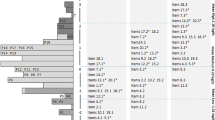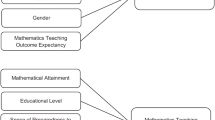Abstract
This paper focuses on efficacy beliefs with respect to teaching mathematics; it aims at testing and validating an existing scale for measuring efficacy beliefs in the domain of mathematics, examining the development of preservice teachers’ efficacy beliefs in mathematics during fieldwork, and identifying factors that contribute to the development of these beliefs. Exploratory factor analysis applied to longitudinal data collected through a questionnaire administered to almost 90 preservice teachers elicited a two-factor model, reflecting efficacy beliefs in mathematics instruction and classroom management. Using cluster analysis, we found four patterns in the development of preservice teachers’ efficacy beliefs regarding these two factors. Our analysis of semi-structured interviews with eight participants representing these four patterns suggested that preservice teachers’ efficacy beliefs were mainly informed by experimentation with teaching and interaction with mentors, tutors, peers, and pupils. Based on our findings, we draw implications for mathematics preservice teacher education and provide suggestions for future research.

Similar content being viewed by others
Notes
FI, SI, and TI are used to denote the first, second, and third round of interviews, respectively.
Abbreviations
- TEB:
-
Teacher Efficacy Beliefs
- TSES:
-
Teacher Sense of Efficacy Scale
References
Armor, D., Conroy-Oseguera, P., Cox, M., King, N., McDonnell, L., Pascal, A., et al. (1976). Analysis of the school preferred reading programs in selected Los Angeles minority schools. California: RAND (ERIC Document Reproduction Service no. 130 243).
Ball, D. L., Hill, H. C., & Bass, H. (2005). Knowing mathematics for teaching: Who knows mathematics well enough to teach third grade, and how can we decide? American Educator, 14–17, 20–22, 43–46.
Bandura, A. (1997). Self-efficacy: The exercise of control. New York: Freeman.
Brouwers, A., & Tomic, W. (2001). The factorial validity of scores on the teacher interpersonal self-efficacy scale. Educational and Psychological Measurement, 61(3), 433–445.
Enochs, L., Smith, P. L., & Huinker, D. (2000). Establishing factorial validity of the mathematics teaching efficacy beliefs instrument. School Science and Mathematics, 100(4), 194–202.
Erickson, F. (1986). Qualitative methods in research on teaching. In M. C. Wittrock (Ed.), Handbook of research on teaching (3rd ed., pp. 119–161). New York: MacMillan.
Gordon, C., Lim, L., McKinnon, D., & Nkala, F. (1998). Learning approach, control orientation and self-efficacy of beginning teacher education students. Asia-Pacific Journal of Teacher Education & Development, 1(1), 53–63.
Henson, R. K. (2002). From adolescence angst to adulthood: Substantive implications and measurement dilemmas in the development of teacher efficacy research. Educational Psychologist, 37(3), 137–150.
Hoy, W. A., & Spero, R. (2005). Changes in teacher efficacy beliefs during the early years of teaching: A comparison of four measures. Teaching and Teacher Education, 21, 343–356.
Kline, P. (1994). An easy guide to factor analysis. London: Routledge.
Kyriakides, L., Charalambous, C., Philippou, G., & Gampbell, R. J. (2006). Illuminating reform evaluation studies through incorporating teacher effectiveness research: A case study in mathematics. School Effectiveness and School Improvement, 17(1), 3–32.
Labone, E. (2004). Teacher efficacy: Maturing the construct through research in alternative paradigms. Teaching and Teacher Education, 20, 341–359.
Lin, H. L., & Gorrell, J. (2001). Exploratory analysis of pre-service teacher efficacy in Taiwan. Teaching and Teacher Education, 17, 623–635.
Manouchehri, A., & Goodman, T. (2000). Implementing mathematics reform: The challenge within. Educational Studies in Mathematics, 42, 1–34.
National Council of Teachers of Mathematics (2000). Principles and standards for school mathematics. Reston, VA: NCTM.
Pajares, F., & Schunk, D. H. (2001). Self-beliefs and school success: Self-efficacy, self-concept, and school achievement. In R. Riding & S. Rayner (Eds.), Perception (pp. 239–266). London: Ablex.
Patton, M. (2002). Qualitative evaluation and research methods (3rd ed.). Newbury, CA: Sage.
Ross, J. A. (1992). Teacher efficacy and the effect of coaching on student achievement. Canadian Journal of Education, 95, 534–562.
Smith, M. L. (2006). Multiple methodology in education research. In J. L. Green, G. Camilli, & P. B. Elmore (Eds.), Handbook of contemporary methods in education research (pp. 457–475). New Jersey: Lawrence Erlbaum.
Strauss, A., & Corbin, J. (1998). Basics of qualitative research: Techniques and procedures for developing grounded theory (2nd ed.). CA: Sage.
Tillema, H. H. (2000). Belief change towards self-directed learning in student teachers: Immersion in practice or reflection on action. Teaching and Teacher Education, 16, 575–591.
Tschannen-Moran, M., & Hoy, A. (2001). Teacher efficacy: Capturing an elusive construct. Teaching and Teacher Education, 17, 783–805.
Tschannen-Moran, M., Hoy, A., & Hoy, W. K. (1998). Teacher efficacy: Its meaning and measure. Review of Educational Research, 68(2), 202–248.
van den Berg, R. (2002). Teachers’ meanings regarding educational practice. Review of Educational Research, 72(4), 577–625.
Author information
Authors and Affiliations
Corresponding author
Rights and permissions
About this article
Cite this article
Charalambous, C.Y., Philippou, G.N. & Kyriakides, L. Tracing the development of preservice teachers’ efficacy beliefs in teaching mathematics during fieldwork. Educ Stud Math 67, 125–142 (2008). https://doi.org/10.1007/s10649-007-9084-2
Received:
Accepted:
Published:
Issue Date:
DOI: https://doi.org/10.1007/s10649-007-9084-2




